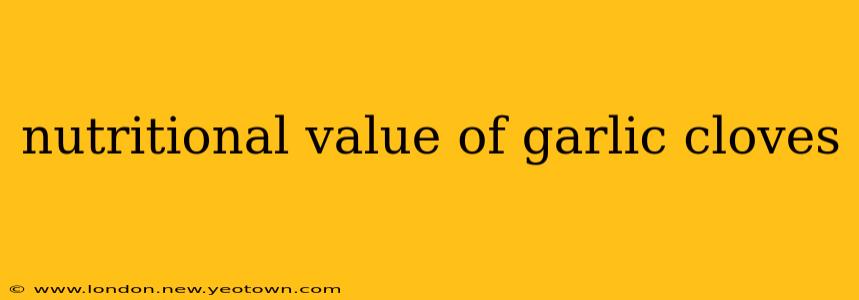Garlic, that pungent bulb often relegated to the side of a recipe, is actually a nutritional superstar. Far from being a mere flavor enhancer, garlic cloves boast a surprising array of vitamins, minerals, and compounds that contribute to overall health and well-being. Let's delve into the fascinating world of garlic's nutritional value, exploring its components and the impressive health benefits they offer.
What are the main nutrients in garlic?
Garlic's nutritional profile is surprisingly rich for such a small ingredient. A single clove (about 1 gram) contains a small but significant amount of several essential nutrients. While the exact quantities vary based on factors like growing conditions and clove size, you'll find a decent source of manganese, vitamin B6, vitamin C, and various other trace minerals. However, it's not just the vitamins and minerals that make garlic special; it's also the presence of potent bioactive compounds like allicin.
What are the health benefits of garlic?
The magic of garlic lies in its bioactive compounds, particularly allicin. Allicin is formed when the enzyme alliinase comes into contact with air, usually when a clove is crushed or chopped. This process releases a cascade of beneficial compounds, responsible for many of garlic's health-boosting effects. Studies have linked garlic consumption to various health benefits, including improved heart health, reduced blood pressure, and enhanced immune function. Remember, these are correlations and more research is always needed to solidify these links.
Is garlic good for blood pressure?
The evidence suggests that garlic may help lower blood pressure. Multiple studies have indicated that regular garlic consumption is associated with a modest reduction in systolic and diastolic blood pressure. The mechanisms behind this potential benefit are still being investigated, but it's believed that the sulfur-containing compounds in garlic play a crucial role. However, it's vital to remember that garlic shouldn't replace prescribed blood pressure medication. Always consult your doctor before making significant dietary changes, especially if you have pre-existing health conditions.
Does garlic help with cholesterol?
Preliminary research suggests garlic may contribute to improved cholesterol levels. Some studies have shown a reduction in LDL ("bad") cholesterol and an increase in HDL ("good") cholesterol among participants consuming garlic regularly. Again, more research is needed to confirm these findings and to determine the optimal dosage and form of garlic for cholesterol management.
Is garlic good for your immune system?
Garlic has a long-standing reputation as an immune-boosting food. Many believe its potent antimicrobial properties contribute to this effect. Allicin and other sulfur-containing compounds in garlic have been shown to possess antibacterial, antiviral, and antifungal activity in vitro (in laboratory settings). However, the extent to which these effects translate to significant immune system improvements in vivo (in living organisms) requires further investigation.
How much garlic should I eat per day?
There's no universally agreed-upon "perfect" amount of garlic to consume daily. The quantity that's beneficial for one person may not be the same for another. Moderation is key. While garlic offers numerous potential health benefits, consuming excessive amounts could lead to digestive upset, heartburn, or body odor. Starting with a small amount—a couple of cloves a day—and gradually increasing it based on your tolerance is a reasonable approach.
What are the side effects of eating too much garlic?
While generally safe, consuming excessive amounts of garlic can lead to some unpleasant side effects. These might include bad breath, body odor, heartburn, upset stomach, and allergic reactions in some individuals. If you experience any adverse effects, reduce your garlic intake. Remember, moderation is key to reaping the benefits without suffering the drawbacks.
This exploration of garlic's nutritional value showcases its hidden potential. While more research is ongoing, the evidence suggests that including garlic as part of a balanced diet could offer several health benefits. However, always consult with a healthcare professional before making any significant dietary changes, particularly if you have any underlying health conditions or are taking medications.

